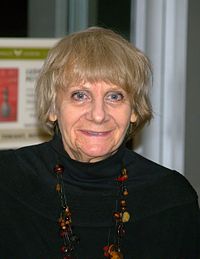Lyudmila Petrushevskaya
| Petrushevskaya | |
|---|---|

In New York City, November 2009.
|
|
| Born |
26 May 1938 Moscow, Soviet Union |
| Genre | Fiction, drama, film, songwriting, singing, visual arts |
Lyudmila Stefanovna Petrushevskaya (Russian: Людмила Стефановна Петрушевская) (born 26 May 1938) is a Russian writer, novelist and playwright.
The Moscow-born Petrushevskaya is regarded as one of Russia's most prominent contemporary writers, whose writing combines postmodernist trends with the psychological insights and parodic touches of writers such as Anton Chekhov. Over the last few decades, she has been one of the most acclaimed contemporary writers at work in Eastern Europe; Publishers Weekly has called her "one of the finest living Russian writers".
In 1979, she was co-writer of the scenario for one of the most influential Russian animated films, Tale of Tales. She served as a jury member in the 3rd Open Russian Festival of Animated Film in 1998.
In a 1993 interview with Sally Laird, translator of her novella The Time: Night, Petrushevskaya said of her own work, "Russia is a land of women Homers, women who tell their stories orally, just like that, without inventing anything. They're extraordinarily talented storytellers. I'm just a listener among them."
Her works include the novels The Time Night (1992) and The Number One, both short-listed for the Russian Booker Prize, and Immortal Love, a collection of short stories and monologues. Since the late 1980s her plays, stories and novels have been published in more than 30 languages. In 2003 she was awarded the Pushkin Prize in Russian literature by the Alfred Toepfer Foundation in Germany. She was awarded the Russian State Prize for arts (2004), the Stanislavsky Award (2005), and the Triumph Prize (2006).
A new collection, There Once Lived a Woman who Tried to Kill Her Neighbor's Baby, was published in the U.S. by Penguin Books in October 2009 and became a New York Times Book Review bestseller in December 2009. In 2010, it won the World Fantasy Award for Best Collection. The first major translation of her work by an American publisher, the stories often contain mystical or allegorical elements which are used to illuminate bleak Soviet and post-Soviet living conditions. The collection of stories has been well reviewed, buttressing Petrushevskaya's reputation in the English-speaking world. An article in Dissent called the collection "a striking introduction to the author's work":
...
Wikipedia
